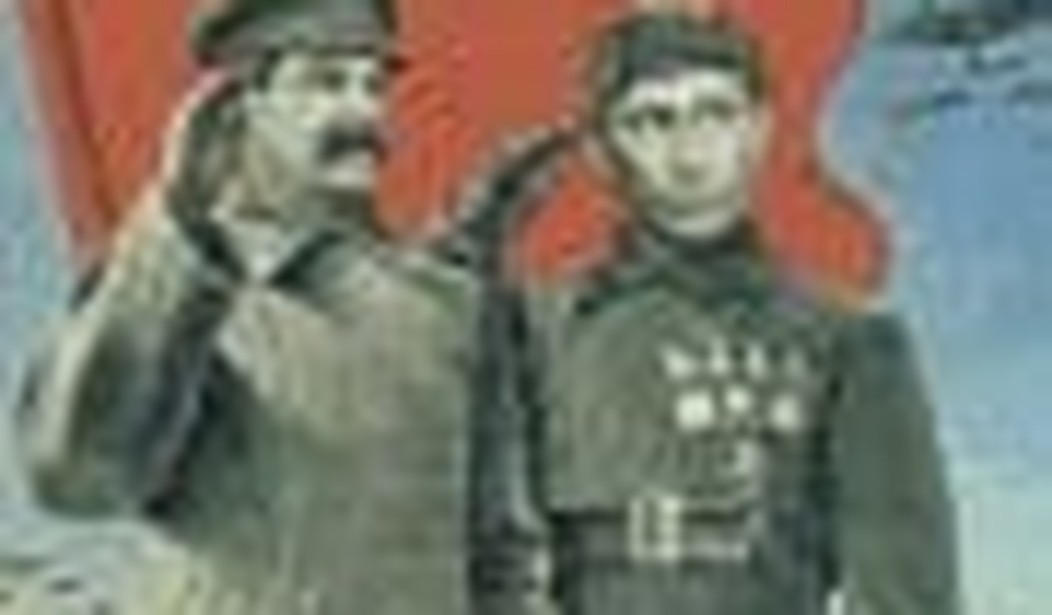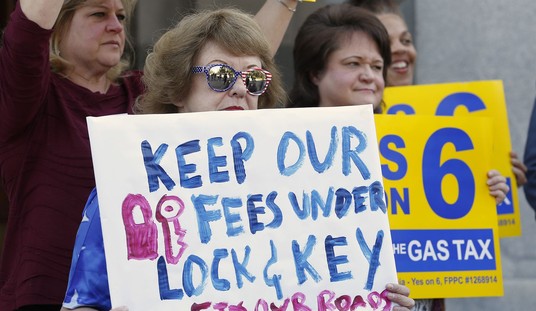The past two weeks have been a virtual Cold War flashback. Russia invades Georgia. The U.S. condemns Russia. Like during the Cold War, the local particularities of the whole affair matter little. All that really matters is the grand game between the “superpowers.” Like in decades past, they didn’t disappoint. Rhetorical potshots between Moscow and Washington zipped back and forth. All of the familiar signs, codes, and tropes were back.
Still, even though it looked like a Cold War and quacked like a Cold War, there was a constant denial of the Cold War. Secretary Rice emphasized that in no way did the increase in tensions with Russia signal a “new Cold War.” The Russians were also reluctant to embrace the “new Cold War.” When Dmitrii Rogozin, Russia’s ambassador to NATO, announced that Russia would freeze cooperation with the alliance, he assured reporters that “there won’t be any aggressive action from anyone on our side. We will behave in a pragmatic manner. … There will definitely not be a Cold War.”
Not a Cold War? Everyone is making arguments that the U.S. and Russia are not in a “new Cold War.” Why engage in the old psychological trick of repressing what you really desire? Especially when the truth is so blatantly clear: officials in Washington and Russia truly desire a new Cold War. There is just something comforting in that predictable, bipolar world, where two grand adversaries face each other in a real-life game of Risk. It’s like two arch enemies at battle. Neither can ultimately defeat the other, yet they seem to complement each other perfectly. As the Joker endearingly told Batman in the Dark Knight, “Kill you? I don’t want to kill you. What would I do without you? … You … you complete me.”
“Mirror, mirror on the wall …”
Russia’s and the United States’ fascination with each other goes back over a century and a half. When some Russian intellectuals looked at the United States they imagined it as the preeminent example of liberal democracy, a bastion of freedom where the individual could flourish. Others, however, viewed the U.S. as culturally vacuous and duplicitous. “[Americans] are polite and kind to us,” wrote A. Faresov in 1904, “but the devil knows what, among themselves, they think about us and what is in the heart of any of them. … I will never learn to read an American by face, to see if he is a swindler or if he considers me a swindler. It’s murder to live in such an environment.”
Americans also viewed Russia as a potential twin. Russia appeared so much like America as much as it did not. By the late 19th century, American Russia-watchers were split into two camps: Russophiles and Russophobes. Russophiles like William Walling envisioned a Russia that could become a “United States of Russia.” Russophobes, however, saw it as a threat to not only American interests, but freedom itself. Whatever their differences, pro- and anti-Russia sentiment was united in the almost messianic belief that Americans had a divine mission to free Russia.
Whatever the positive or negative views Russians and Americans held about each other, neither saw the true America or true Russia. In the words of historian David Foglesong, for Americans Russia served as a “dark double” or “imaginary twin.” What was reflected back to them said more about themselves than their admired adversary. “Treating Russia as both a whipping boy and a potential beneficiary of American philanthropy,” Foglesong writes in his excellent The American Mission and the “Evil Empire,” “fostered in many Americans a heady sense of their country’s unique blessings, and reaffirmed their special role in the world.” The interesting thing is that to some extent the same could be said for the Russians.
Cinematic simplicity
The Cold War only intensified Americans’ and Russians’ mutual fascination. In America, it provided all sorts of chest-pounding, nation-uniting political and cultural products. Heroes such as John Rambo, James Bond, and Jack Ryan, not to mention pop Cold War classics like War Games, Red Dawn, and Rocky IV, inspired new generations to the great cause. Moreover, America was always the undisputed winner in these films. They crafted a mythical world wrought with intrigue and danger. But it was a predictable world where all evil emanated from one center: Moscow.
One way to really appreciate how much the Cold War was a cultural-ideological goldmine is to compare it to the Global War on Terror. We’re eight years in and the GWOT’s impact on the silver screen has been a parade of socially conscious tearjerkers. Absent are the heroic epics where American values and might decisively triumph over the enemy. If anything, GWOT films mostly chronicle the loss of American innocence through sensitive tragedies that serve as therapy for the traumatic shocks of 9/11. Films like United 93 (2006) and World Trade Center (2006) focus on how hope and humanity are discovered at the very moment all appears lost. The films that do deal with the GWOT, like Syriana (2005) and Charlie Wilson’s War (2007), are critical and multi-layered attempts to tell the whole story. In the end, they fall flat because they involve too many characters, too many locations, too many narratives, too many moral gray areas, and perhaps most important, they have no inspiring, mythic heroes.
GWOT films also have a problem making the terrorists into the villains. Perhaps it’s because we can’t imagine them smart, cultured, or advanced enough. A terrorist equivalent to Dr. No or Goldfinger just doesn’t seem probable. Even when terrorists are the villains, they turn out to be mere proxies devoid of evil agency. Take, for example, this summer’s Iron Man (2008). Tony Stark becomes Iron Man because he’s captured by terrorists who want him to make them his cataclysmic Jericho missile. It turns out, however, that the real villain isn’t the terrorist Raza, but Stark’s double-dealing, corrupt, and amoral business partner, Obadiah Stane. The film’s message is that the real enemy isn’t terrorism but unfettered capitalism. The terrorists and Iron Man are merely pawns of corporate greed, apparently just like the rest of us.
Some will say the lack of heroic GWOT films is because America-hating liberals control Hollywood. Maybe, but that excuse isn’t good enough. The real problem is that the GWOT fails where the Cold War excelled: simplicity. The GWOT is just too hard to narrate. The Cold War was a battle of good vs. evil, the villains were easily identifiable, and perhaps most important they looked and for the most part acted like us. In this sense Robert Gates’ sentimentality for the Cold War as a “less complex time” and Niall Ferguson’s longing for the Cold War because “Soviet wickedness made politics so much simpler” are culturally apt. Not only did the Cold War make politics simpler. It made heroes, villains, and plotlines simple too.
The Russians are also desiring a simpler time. Soviet Russia too held up America as a litmus test for its own success. Noting American hypocrisy, unemployment, decadence, racism, and poverty were staple tropes in Soviet propaganda. Take for example the famous Soviet children’s story Mister Twister (1933). Adapted to animation in 1963, Mister Twister chronicles the decadence and racism of Mr. Cook, a former American government minister and banker, on his visit to Leningrad. Mr. Cook is appalled by the presence of a black man in his hotel, and he is sent into a fit of anxiety as the hotel mirrors multiply the African’s presence. Finally, after some desperation and a lesson in Soviet ethics, Mr. Cook learns the errors of his ways and embraces Soviet multiculturalism. The film’s message served as an ideological ace in the hole for the Soviets. “Sure, we have our problems,” the Party said, “but at least we aren’t the decadent, racist, and hypocritical Americans!”
This sentiment continues today. In fact, one can say that Putin’s entire second term was an effort to relive the bygone days. What better way to restore glory than by creating the specter (real or imagined) of a vulturous United States waiting to pick the Soviet carrion clean. Any challenge to the Kremlin’s domestic or foreign interest was quickly cast as the nefarious machinations of the United States. One need only consider the currency of Soviet nostalgia. Indeed, the revival of the grand U.S.-Russia struggle struck a particular cord among Putin’s young, anti-colored revolution shock troops, Nashi. The fact that many Nashists are too young to remember the Cold War was like an untapped xenophobic spring. Opponents to the Kremlin were depicted as agents of American imperialism. Now with the threat of “colored revolution” declared vanquished, Nashi is having difficulties coming up with a new enemy and purpose. Perhaps the Georgian War will give them new vigor.
Revel, don’t repress
The Russian and American publics are poised to embrace Cold War II. A recent poll showed that about a quarter of Russian respondents felt that the United States was to blame for the Georgian War. Russian anti-Americanism appears to be increasing. Noting American hypocrisy is cool again as this joke swirling around Moscow attests:
American journalist is interviewing American housewife:
Well, Mrs. Smith, you’re sayin’ you have a happy family?
Oh, yes! My husband and I — we have four sons — and we are happy!
Where are they?
My youngest — John — he’s in Iraq now. The second — Mike — in Afghanistan. Third — Bill — in Kosovo and the fourth — Jack — is training to go to Iran.
So, they are serving the country to defend democracy. Well, where’s your husband?
Oh, now he’s traveling ’round the world giving lectures.
What is the topic?
I don’t know exactly — something in politics — seems like “How to prevent Russians from occupying other countries.”
In America, the response to the Georgian War proved once again that Russia as whipping boy is still an effective means to rally the masses. John McCain’s tough talk toward Russia was a campaign booster. It is no coincidence that his bump in the polls coincided with the reemergence of the Russian military menace. As a result, 55 percent of Americans believe that McCain is “best qualified to deal with Russia.” Obama, who was slow to jump on the Russophobic bandwagon, only captured 22 percent of respondents’ faith. If McCain wins in November he should send Medvedev and Putin a box of chocolates in gratitude.
If the Cold War had and continues to have so many benefits, why deny Cold War II? Why repress what you really desire? The Cold War was the best of times and the worst of times. Both Russia and the United States were at the pinnacle of power that was ironically secured in their mutual adversarial existence. The Islamic enemy, on the contrary, only reveals our sentimentality, our weakness, and our hesitance. The Russians, however, are a real enemy easily amendable to political and cultural simplicity. They are an enemy we can talk to. One that reflects our own fantasies about ourselves back to us. Russians and Americans, embrace your symptom! Embrace your mutual paranoia, your inability to evaluate yourself without your dark other! The Cold War has so much more to give. Why continue to repress a good thing? Treat yourselves.









Join the conversation as a VIP Member